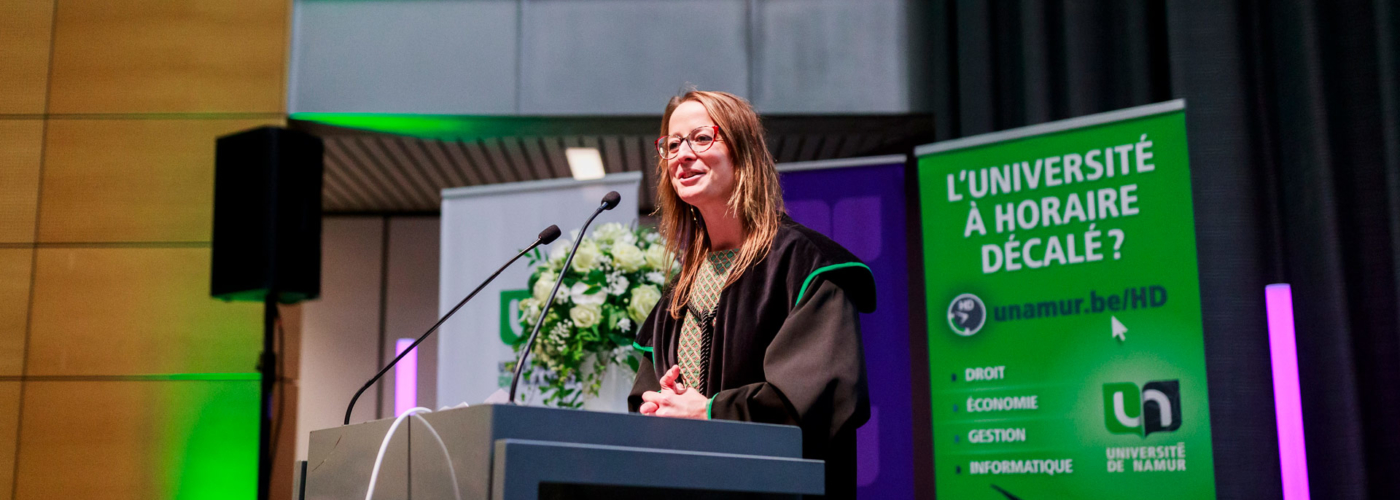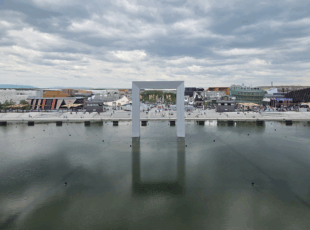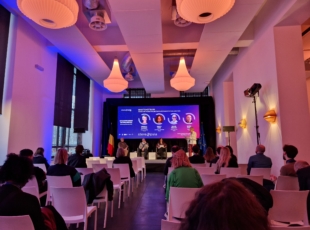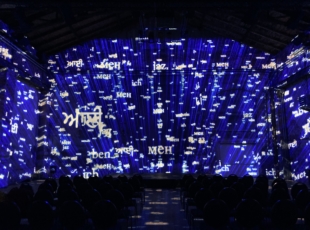Amélie Lachapelle: ‘the digital transition will have to be green or it will not take place’

Article author :
Whilst the ‘all-digital’ idea is each day gaining ground, legal expert Amélie Lachapelle highlights a key challenge: the shift to digitalisation will have to factor in the issues of sustainable development.
It was two years ago that Amélie Lachapelle was hired as a professor of environmental and sustainable development law at the Faculty of Law and the Research Centre in Information, Law and Society (CRIDS) at the Namur Digital Institute (NADI). It is no bed of roses being at the beginning of a career. It is imperative to establish one’s legitimacy by carrying out high-quality research and constructing multiple courses to be taught to the students. And to throw yourself into the university community. ‘I am the faculty’s go-to person for sustainable development. That allows me to reflect on the strategy to be implemented in order to incorporate sustainable development and the transition to the green economy into our research and our courses. This is crucial because, as teachers, we have a privileged platform through which to percolate these ideas down to the people who are most affected by the future of the planet.’
With Grégoire Wieërs, a professor of medicine, during the next academic year she will be launching the Sustainable Development and Transition Education Days (JEDDT). They will be the very first interdisciplinary training days geared towards Block 3 students across all the faculties.
Reconciling the digital transition and the green transition
At the start of the 2020s, Amélie Lachapelle was abruptly thrust into the limelight. The expertise on whistleblowers that she had developed over the course of her thesis was what earned her this public prominence. Addressing this highly topical subject from several perspectives, she identified various societal transformations, such as participatory democracy, linked to a wider movement calling into question the modern Western system.
This heightened her interest in the green transition and formed the foundation for her research on the impacts of the ‘all-digital’ notion from the perspective of environmental law.
‘This theme is a vast and fascinating one. I am looking to understand how European law becomes transformed through the issues of transition and sustainable development. My starting point is the Brundtland report, written in 1987. This is based on two concepts: the concept of need and the concept of limitations. That opens the door to interesting reflections in terms of the digital realm. For example, whilst the guiding rationale for years was to innovate for the sake of innovating, presupposing that society would always find some usefulness in every new technology, does the technology currently being developed genuinely respond to social issues? Does it meet a societal need? Does its production take into account planetary limits? These questions are addressed from the perspective of digital sobriety.’
And her already rich spectrum of interests does not end there. She is also investigating whether the principles of prevention, precaution, the polluter pays and of integration, with their roots in the Treaty on the Functioning of the European Union, are indeed applied within the context of European policies on the digital realm. ‘There remains a form of compartmentalisation: measures are taken to foster the digital transition without necessarily specifically including these environmental concerns,’ she is sad to say.
For two years now, driven by this desire to raise awareness, together with Professor Laura Rizzerio she has co-organised a series of lectures at the UNamur on another subject close to her heart: the commons. ‘The transition is leading, for example, to a new approach to the right to own property. But also to a renewal of the ways of doing democracy. And to rethinking health from a common health approach. A human being cannot be healthy if the society, the community, the planet they occupy are not in good health!’ continues Amélie Lachapelle. And she notes: ‘it is very interesting and satisfying to be able to combine the reflections you have in your private life with your professional life.’
Mad about history
She talks with passion about the potential of the legal domain. When exactly did this interest come into being? ‘I have to be honest; law was never a childhood dream. I initially wanted to be an archaeologist or an Egyptologist because I love history. Indeed, it was this love which got me interested in the sycophants of Ancient Greece (Editor’s note: people who, through the lure of profit, earned a living from reporting people for minor transgressions) in my doctorate of law thesis on whistleblowers. Nothing obliged me to trace the timeline that far back. I did so purely because I am fascinated by it. It sheds light on the world, furthering our understanding of the problems which need to be faced at the present time.’
‘So, when I was a child, I leaned more towards history. But when I was in primary school, I told myself that I didn’t want to find myself stuck in a pyramid,’ she explains with a smile. ‘A pragmatic concern. I am pretty claustrophobic. And I didn’t feel very comfortable with the idea of carrying out archaeological excavations.’
Her interest then turned to palaeontology, another means of getting close to history by observing fossils to understand the lifeforms which have existed over the course of geological time. The appeal of this subject has never left her. Driven by her endless fascination, it is not uncommon for Amélie Lachapelle to return from one of her walks with an old bone or a rock carrying the trace of a mineralised organism.
When I told my friends that I was doing a doctorate, they were not at all surprised. They told me that, if truth be told, I had started my doctorate in nursery school.
Research, rooted in her DNA
Like many young people, Amélie Lachapelle was unsure about her future. Having taken care during her secondary education to leave no door shut by choosing a mix of the literary and the scientific, she did not know what to do with her life.
‘I also for a while considered being a scientist specialising in signs of paranormal activity because I was interested in the possibilities of extraterrestrial life, a little over-influenced by a series on that theme. In the end I discarded these childhood possibilities to focus on law, on the advice of a careers counsellor. Following a number of tests she had me do, she was convinced that I was made for the subject. And it has proved to be a good choice.’
‘Law can be studied from the outside from the historical and sociological angles I adore. I am very comfortable in the role of spectator in my life. On evenings out, I will be the one who is observing, analysing what is going on. With my inherent curiosity, I am a researcher at heart, who likes to mix different fields of expertise together. When I told my friends that I was doing a doctorate, they were not at all surprised. They told me that, if truth be told, I had started my doctorate in nursery school.’
An artist’s soul
In parallel with her deep interest in building knowledge Amélie Lachapelle has enthusiastically engaged with the arts world. No less than fourteen years as a pianist and ballet dancer, as well as six years treading the boards in theatre: she felt perfectly at home at the Academy. But once she enrolled at university, being involved with these activities in addition to her studies proved very difficult. ‘When I had a dress rehearsal in Binche which dragged on until 11 pm, and I had to be at UNamur the next day at 8.30 am for lessons, it was pretty challenging. I managed it in my first year, but I had to drop it because I was finding it really difficult to combine these two worlds.’
‘Also, having been very creative prior to university, I developed various blocks. It’s not that I’d lost my self-confidence but, having thrown myself into a different intellectual dynamic, I saw things differently. I was more stressed, it became harder and harder to clear my mind.’
Now, Amélie Lachapelle would like to make room again for creativity in her life. The first step was to purchase a piano. ‘When I got it set up at home last year, I played a great deal. I had missed it so much! At the moment, I am just getting started on my academic career, which takes time and energy. But I plan to create more space for my creative side. Both personally and professionally.’
‘Little by little, I am trying to incorporate more creative and artistic activities into my courses, because it is vital for students to develop these skills. They are the ones which will enable them to innovate and to come up with other solutions, different to those absorbed, sometimes passively, on the university benches. It is essential, in the context of the green transition. Creativity is something that is worked on and fostered. By being more creative myself, I hope to lead by example and to support them in this process.’
A story, projects or an idea to share?
Suggest your content on kingkong.





